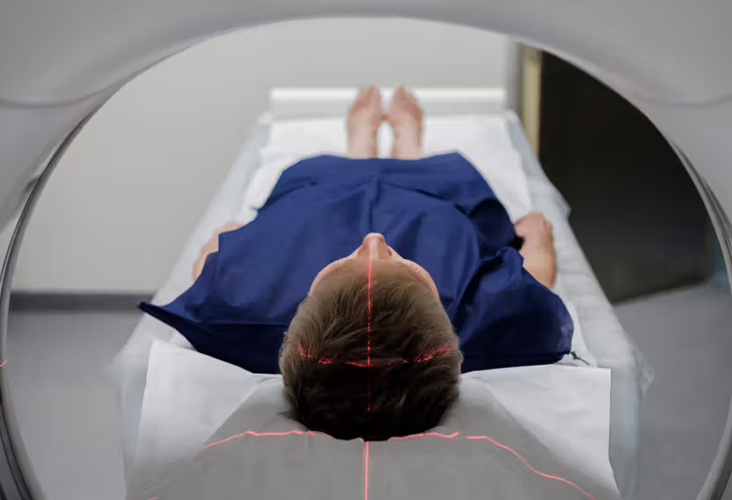NDIS Support for Radiologically Isolated Syndrome (RIS)

Radiologically Isolated Syndrome (RIS) is a neurological condition characterized by the presence of lesions in the brain's white matter, detected through MRI scans, but without the clinical symptoms that typically accompany multiple sclerosis (MS) or other neurological disorders. RIS is often an incidental finding during imaging done for unrelated health reasons, and while the syndrome itself does not exhibit overt symptoms, it may still indicate an early stage of multiple sclerosis or other neurological conditions.
The NDIS (National Disability Insurance Scheme) in Australia provides essential support for individuals diagnosed with RIS to ensure early intervention and continuous monitoring of their condition. The challenge with RIS lies in the uncertainty regarding its progression. Some individuals may remain symptom-free, while others may develop neurological symptoms over time. In either case, the NDIS offers support services aimed at improving the quality of life and providing assistance with managing the potential risks associated with RIS

RIS refers to the identification of white matter lesions in the brain that resemble those seen in multiple sclerosis (MS) but without the classical MS symptoms such as motor weakness, visual disturbances, or sensory changes. The lesions, often detected on MRI, are typically located in the brain's white matter and resemble those seen in patients with MS, though RIS itself does not manifest clinical signs.
The lesions found in RIS are often periventricular (around the ventricles of the brain), juxtacortical (near the cortex), and infratentorial (near the brainstem and cerebellum). These areas are typically affected in MS as well, but the absence of accompanying neurological symptoms makes RIS distinct from MS.
Diagnosing RIS requires a comprehensive neurological examination,
including a detailed MRI scan.
The
criteria for diagnosing RIS are as follows

The MRI must show multiple lesions (white matter plaques) consistent with those found in MS, which are not caused by other conditions like vascular changes or age-related degeneration.
The person must not exhibit any neurological symptoms or impairment that would typically be associated with MS or another neurological disorder.
It is critical to exclude other possible causes of the brain lesions, such as ischemic changes or autoimmune conditions.
Given the nature of RIS, it is often considered a potential precursor to MS, but it does not necessarily mean that all individuals with RIS will develop MS. Long-term monitoring is vital to track any progression or emergence of symptoms that could indicate the onset of MS.

While RIS in itself may not present any symptoms, it carries a potential risk of progression to MS or other neurological disorders. Studies suggest that approximately 25% of individuals with RIS will go on to develop clinically definitive MS over the course of 5 to 10 years. The progression depends on several factors, including genetic predisposition, the presence of additional lesions, and the individual’s immune system response.
Because of the possibility of progression, early intervention through monitoring and support can help individuals manage their condition and improve quality of life, even if symptoms are not currently present. RIS should therefore be closely monitored with regular MRIs and clinical evaluations.
The NDIS offers support for people diagnosed with RIS, focusing on early intervention, ongoing care, and management of potential risks associated with progression. The NDIS can help individuals navigate the uncertainties of RIS through various supports
Health Professionals: Regular check-ups and assessments by neurologists, physiotherapists, and occupational therapists to monitor the condition and detect early signs of MS progression.
Education and Awareness: Helping the individual and their family understand RIS and the potential for progression, as well as educating them about the symptoms to watch for.
Physiotherapy: To promote mobility and strength, and to maintain physical function in the absence of symptoms.
Occupational Therapy: Focused on assisting with daily activities and developing coping strategies to manage potential challenges should symptoms develop.
Speech Therapy: For individuals who may experience speech or communication difficulties later due to disease progression.
Mobility Aids: Walkers, scooters, and other mobility devices to assist with movement.
Communication Devices: Speech-generating devices and other tools to support communication if needed in the future.
Counseling Services: Support for individuals and families to manage stress, anxiety, and uncertainty associated with RIS.
Psychological Therapy: Regular sessions with a psychologist to help manage any emotional distress and prepare for potential changes in health.
Home Accessibility: Installation of ramps, handrails, or changes to bathroom facilities to prepare for any future needs.
Community Activities: Programs designed to promote interaction and integration within the local community.
Social Programs: Encouraging participation in group activities, clubs, or recreational programs to maintain social wellbeing.
To access NDIS support for RIS, individuals need to

This form is available on the NDIS website and requires individuals to submit their medical documentation, including MRI results and confirmation from a healthcare provider diagnosing RIS.
Regular updates from neurologists or specialists may be required to ensure that the individual’s condition is accurately tracked and monitored.
After accessing the NDIS, an NDIS planner will assist in developing a support plan tailored to the individual’s needs. This plan will outline the necessary supports and services required, including therapy, assistive technology, and home modifications.
While the NDIS provides essential support, individuals
diagnosed with RIS may encounter certain
challenges

Since RIS can remain asymptomatic or progress unpredictably, it can be difficult for individuals to plan for future needs.
Availability of specialized services, such as neurologists and therapists experienced with RIS and MS, can vary depending on location.
Understanding and navigating the NDIS application process, including determining eligibility and developing a support plan, can be complex for many individuals.
Radiologically Isolated Syndrome is a complex condition that requires careful monitoring and early intervention. The NDIS plays a crucial role in providing the necessary supports for individuals diagnosed with RIS, ensuring that they receive timely access to therapies, early interventions, and psychological support. As RIS may progress to MS or another neurological disorder, the ability to monitor the condition and access appropriate services is vital for maintaining quality of life and wellbeing.
By offering comprehensive support, the NDIS helps individuals with RIS navigate their condition, manage potential symptoms, and remain active and engaged in their communities. Regular medical assessments, access to mental health support, and assistive technologies can make a significant difference in managing RIS, providing a sense of security and readiness for the future.

Immediate Care is here to empower individuals and their families, providing the support they need to live fulfilling lives. Our team’s dedication and expertise make us a leader in the field of disability services.
For more information or to discuss how we can support you, contact Immediate Care today.
Woodstock, Victoria 3751